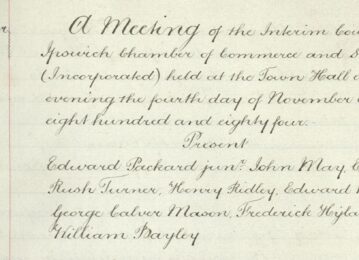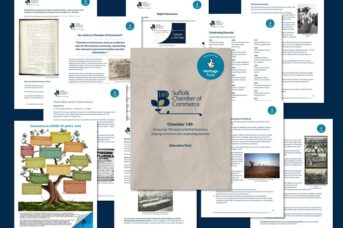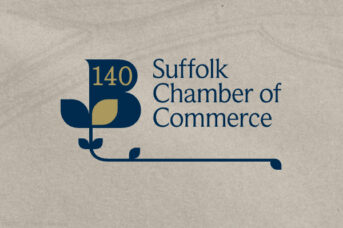The Foundation of the Chamber
On 9th May 1884, a group of influential business leaders came together and founded the first Chamber of Commerce in Suffolk, a dedicated body to champion matters of trade and questions of mutual interest in the business community. Spearheading this endeavour was the town’s port authority, the Ipswich Dock Commission, whose role today is operated by Chamber patron, Associated British Ports.
As they faced the disadvantages of antiquated administration, and fragmented dealings with entities including railway companies and postal services, they understood the immense power that solidarity brought. They recognised a fundamental truth: strength lies in numbers, and confronting challenges collectively far outweighs individual efforts.
Their foresight created the Suffolk Chamber of Commerce —a testament to the enduring principle that unity yields strength.
“It was in every way desirable in matters of that kind that traders should act collectively, and not individually.”
The Ipswich Journal, 9th May, 1884
Edward Packard and the meeting of the IDC
A newspaper clipping found in the Ipswich Journal from May 1884 reveals the details of the meeting, held by the IDC.
The Chamber was first proposed by Mr Edward Packard Jr., director of fertiliser manufacturer E. Packard & Sons.
In the meeting, Packard spoke of the emerging competition between the docks at Parkeston and Ipswich for trade. He was keen to ensure the prosperity of Ipswich into the future. He felt that a new organisation was essential to bring forward matters concerning trade and to maintain the vital trading links established since the construction of the wet dock in the 1840s.
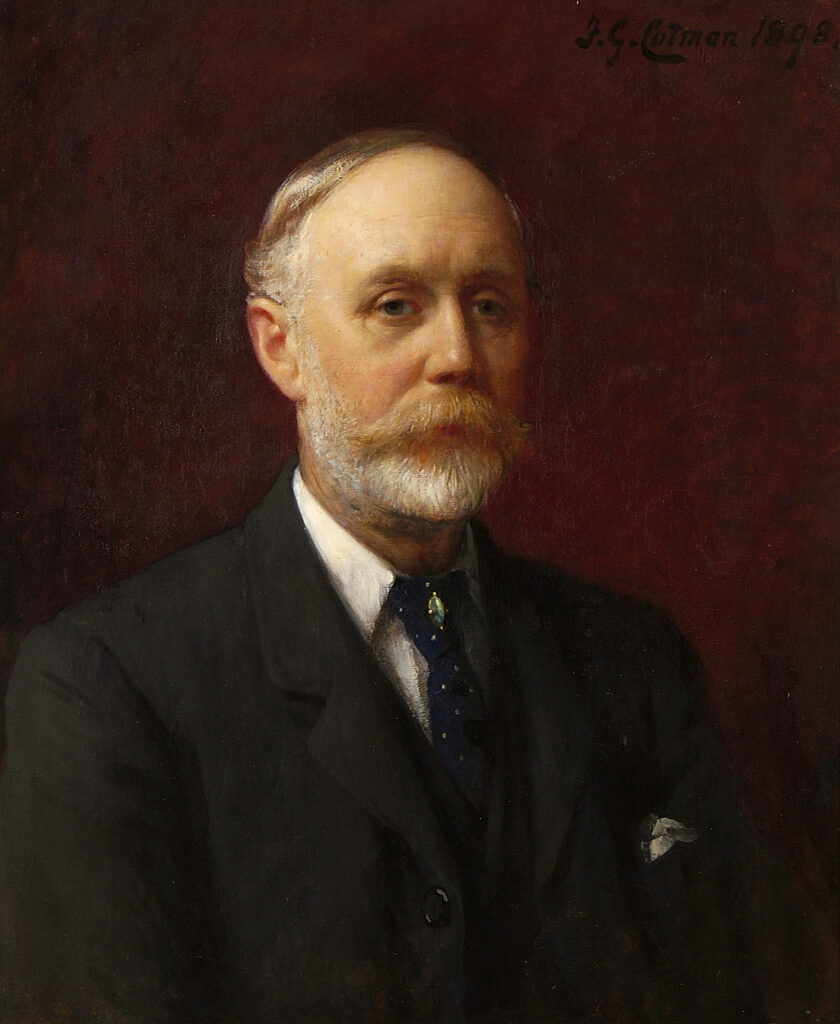
“Chambers of Commerce would take a much more enlarged view of these matters than private individuals could…”
The Ipswich Journal, 9th May, 1884
The proposal for the Chamber of Commerce was gladly received and the motion was carried forward. On August 27th, 1884, the Ipswich Chamber of Commerce and Shipping was officially incorporated.
Explore our original memorandum below…
The earliest records of the Chamber minutes, which can now be found at Suffolk Archives, reveal the first formal meeting of the Chamber took place in Ipswich Town Hall in November 1884.
During this meeting, the foundational Bye-Laws were established, setting the processes and functions of the original Chamber.
So, how did the Chamber function in 1884?
In 1884, the Suffolk Chamber was made up of businesspeople who would meet once a quarter to discuss significant matters brought before the Chamber.
An Executive Committee was made up of a Chairman, a Vice Chairman, a Treasurer and a Secretary – roles that the Chamber still operates today.
The main roles of the Chamber included lobbying and petitioning, providing information to local businesses, and arbitration between firms. By 1896, the Secretary of the Ipswich Chamber of Commerce was authorised to sign Certificates of Origin, a function that is still operated by the Chamber today.
Early Chamber work
Some of the Chamber’s earliest work centred on establishing strong relationships with the Great Eastern Railway. They worked to improve conditions and prices for local traders using the railway links to transport their goods.
A major breakthrough with the GER came in the mid-1880s, when the Chamber presented a petition of manufacturers, merchants and traders in Suffolk against a new Rates and Charges Bill. Introduced in 1885, the Bill proposed to increase the railway tolls on a variety of goods – both raw and manufactured – which would have raised the cost of production and restricted the distribution of manufacturers and merchandise.
This would have had a serious impact on the businesses in Suffolk, particularly those around the Ipswich dock, who would have lost trade through the dock and its railway links.
Following the petition, and with publicity raised through newspaper reporting across Suffolk, the Bill was withdrawn. This marked a significant victory for the Suffolk business community, and a proud achievement for the Chamber.
Alongside their lobbying, the Chamber was also concerned with improving local educational facilities. Throughout the late 1800s, the Chamber worked to better support skills development in Suffolk, with a particular focus on commercial and industrial skills.
In 1892, the Chamber formed its first Commercial and Technical Committee, and worked closely with local schools to support improvements in education. They even awarded prize funds to the Ipswich School for their awards in the late 1890s.
Our earliest members
An early report conducted by the Chamber listed our earliest members – some of whom remain amongst our membership today, a testament to the strength of our 140 years!
Delve into our records and see if you recognise any of these historic Suffolk businesses…
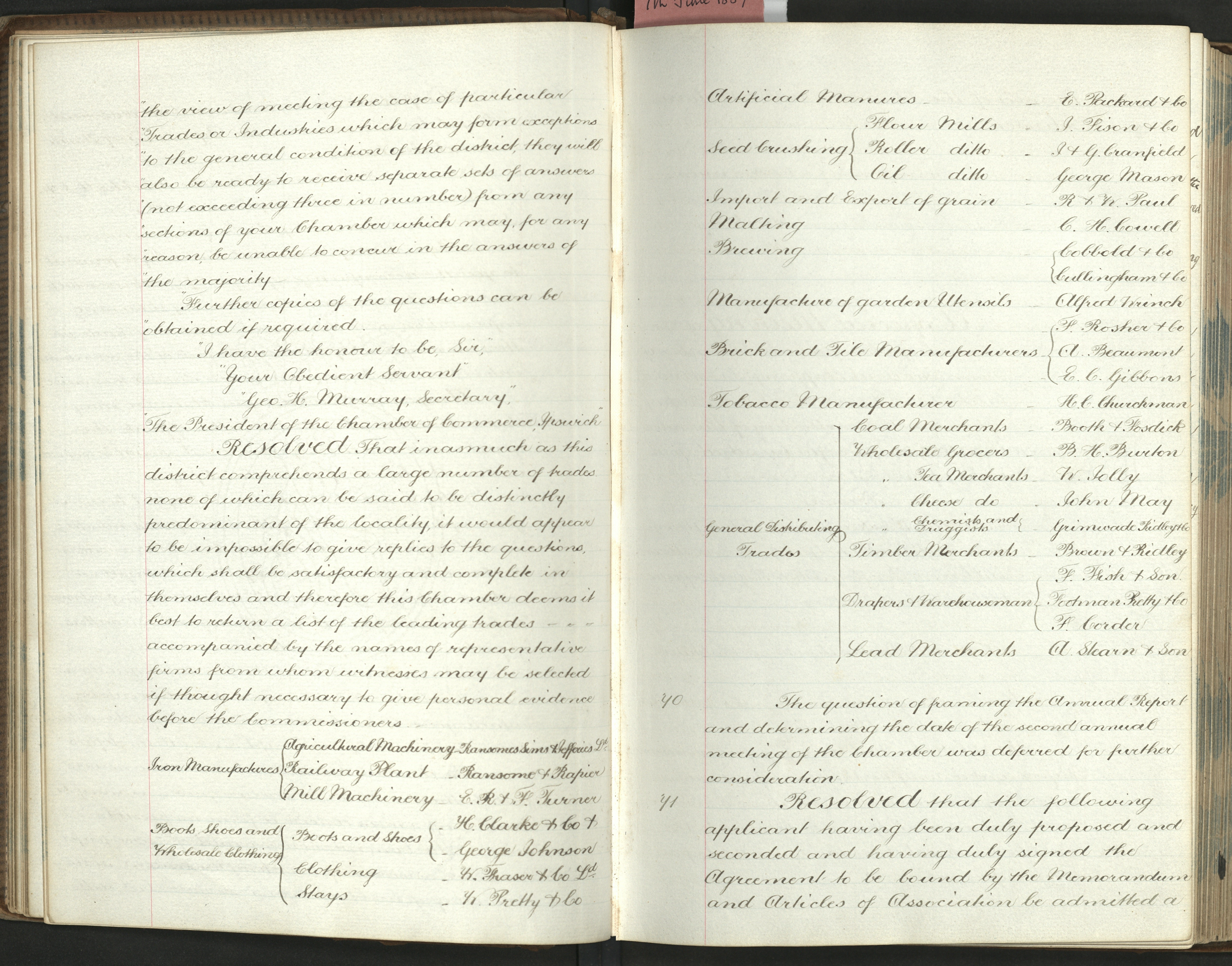
| A. Beaumont | (Brick & Tile manufacturers) |
| A. Slearin & Son | (Lead Merchants) |
| Alfred Wrench | (Manufacture of Garden Utensils) |
| B.H. Burton | (Wholesale Grocers) |
| Booth & Fosdick | (Coal Merchants) |
| Brown & Ridley | (Timber Merchants) |
| C.H. Cowell | (Malting) |
| Cobbold & Co | (Brewing) |
| Cullingham & Co | (Brewing) |
| E. Packard & Co | (Artificial Manures) |
| E. R. & F. Turner | (Mill Machinery) |
| E.C. Gibbons | (Brick & Tile manufacturers) |
| F. Corder | (Drapers & Warehouseman) |
| F. Fish & Son | (Timber Merchants) |
| F. Rosher & Co | (Brick & Tile manufacturers) |
| Footman Pretty & Co | (Drapers & Warehouseman) |
| George Johnson | (Boots & Shoes) |
| George Mason | (Oil Mills) |
| Grimwade Ridley & Co | (Chemists) |
| H. Clarke & Co | (Boots & Shoes) |
| H. Fraser & Co Ltd. | (Clothing) |
| H.C. Churchman | (Tobacco Manufacturer) |
| J. & G. Cranfield | (Roller Mills) |
| J. Fison & Co | (Flour Mills) |
| John May | (Cheese Merchant) |
| R. & W. Paul | (Import & export of grain) |
| Ransome & Rapier | (Railway Plant) |
| Ransomes, Sims & Jeffries Ltd. | (Agricultural machinery) |
| W. Jolly | (Wholesale Tea Merchant) |
| W. Pretty & Co | (Stays) |
